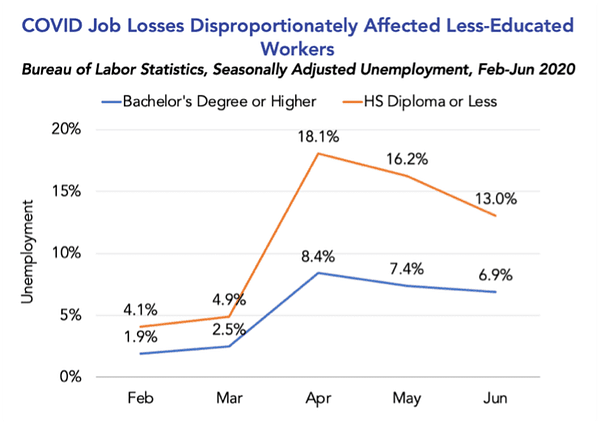 Postsecondary degrees and credentials matter more than ever to attaining a stable, decent-paying job. At the height of the pandemic in April, 18% of Americans with a high school diploma or less were unemployed. For those with a bachelor’s degree, that figure was only 8%. But while degrees and credentials are critically important, they remain unaffordable and inaccessible to many Texans. Since 2003, net tuition and fees at public universities in Texas have increased by 66%. Further, postsecondary degrees and credentials are at times not closely aligned with local workforce needs, meaning that students struggle to find good jobs after graduating.
Postsecondary degrees and credentials matter more than ever to attaining a stable, decent-paying job. At the height of the pandemic in April, 18% of Americans with a high school diploma or less were unemployed. For those with a bachelor’s degree, that figure was only 8%. But while degrees and credentials are critically important, they remain unaffordable and inaccessible to many Texans. Since 2003, net tuition and fees at public universities in Texas have increased by 66%. Further, postsecondary degrees and credentials are at times not closely aligned with local workforce needs, meaning that students struggle to find good jobs after graduating.
At Texas 2036, we are encouraged by efforts from the private sector to create high-quality alternative credentialing programs that are fast, cheap, and closely aligned to workforce demands. National employers such as Google, IBM, and Amazon, for example, have built their own alternative certification or training programs to ensure their talent needs are met with a sufficiently skilled workforce. We believe efforts such as these – paired with a high-quality, robust traditional postsecondary education system – can help to expand access to degrees and credentials for Texans of all backgrounds and ensure that our population has the knowledge and skills necessary to attain good jobs and sustain the state’s tremendous economic growth.
For more Texas 2036 analysis on postsecondary education and the workforce, see our blog posts on student-facing information, living wage credentials, and credit transfer.
